Welfare
The phone rings at the offices of Gingerbread, the charity that gives help and advice to single parents. A young mother, with a baby, is on the line. She earns just over £17,000 a year but is worried about the latest round of government welfare and tax changes. The reforms will cut £530 a year off her annual income. She finds it hard enough already, and is not sure how she’ll cope. She thought Theresa May’s government was going to help her, not make life more difficult.
Another young mother rings in. She has four children under the age of 13 and receives income support, but the effect of the government’s cap on benefits has been to reduce her housing benefit by £100 a week. She lives in private rented accommodation outside London and is struggling financially. These are the kind of cases Gingerbread deals with every day.
Another single parent calls and explains that she is looking after three children including twins, who are under a year old. They are in living in temporary accommodation in a single room because they could not afford to stay in their previous home after the benefit cap came into force last November. This young mother cannot go out to work because the twins are still so young and she doesn’t know where to turn.
Many families like these are also increasingly trapped in debt, having to rely on credit cards they struggle to pay off, as the Financial Conduct Authority reported last week.
The prime minister can talk of helping those who are striving but still struggling to get by, but these people want to see evidence that she means it. Last week the government issued a new report on its Troubled Families programme, which Gingerbread criticised for “failing to address structural obstacles facing single parents out of work, such as lack of access to childcare, flexible work and training”. The charity said it looked like a “cynical distraction” from a new round of “brutal” benefit cuts that would “slash support from those who need it the most”.
Charities are warning that inequality is rising, not falling, with those at the bottom faring the worst. The Resolution Foundation thinktank calculates that welfare and tax changes introduced last week will leave a middle-income family earning £33,500 a year, with three children including a baby, £2,500 worse off overall as a result, losing £2,700 from benefit cuts while gaining £160 from tax cuts. For them, that is the real crisis that needs addressing.
Toby Helm
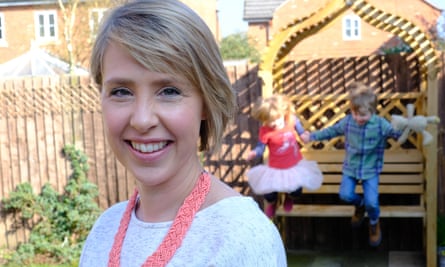
Childcare
There’s a lump in Sally Handley’s throat when she recalls the moment that she called her local Sure Start centre and the voice on the other end told her to drop round with her two young children.
“We had just moved back to Cheshire from London and it was taking time to settle back. I was feeling quite stressed and the kids were also frustrated,” she says. Within hours of the call, she was at the centre with her son and daughter, aged five and three. Staff were also instrumental in helping when her son developed signs of a speech impediment.
Two years later, she has thrown herself into campaigning to save the same centre, in the face of plans by the Conservative-controlled Cheshire East council to “redesignate” a number of Sure Start centres in the area and replace them with mobile services.
Research suggests that the concerns of Handley and other parents are replicated all over the country. A third of designated Sure Start centres, part of a scheme set up to help disadvantaged children when Tony Blair was prime minister, have been lost since 2010 in England, according to figures released last week by Labour.
Many nurseries are also facing closure as a result of government cuts. More than one in 10 state-funded nursery schools believe they will have to shut their doors within the next few months, according to a new survey by an all-party parliamentary group. They, and nurseries in the private sector, will soon come under additional pressure if they are to offer 30 hours of free childcare – double the current 15 available – for three- to four-year-olds that the government wants them to provide from September. Campaigners say that the level of government funding is inadequate to cover the cost to many of the nurseries of providing these extra free hours.
Handley says that, despite Cheshire’s reputation as an affluent area, many local families who used the threatened Sure Start centre were dependent on food banks.
“These Sure Start centres really are little jewels in our communities and it just feels like the most vulnerable people, those who need them most, are the ones who will lose out,” she says.
Ben Quinn
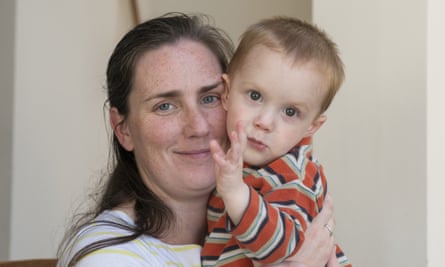
Housing
Valerie Wolfkamp knows all too well how the government’s austerity drive threatens her ability to keep a roof over her head.
The holder of three degrees, she lives in a three-bedroom house with her five-year-old son and 18-month-old twin boys and works part time in Bristol University library, earning around £600 a month after tax. Along with around 500,000 working people in Britain, and 1.2 milion people in total, she relies on benefits to help her meet her rent, paid to a private landlord.
“My housing benefit is roughly £700 a month and my rent is £925 a month, so to make up the shortfall I have to rely on tax credits or my salary, which after paying for essentials doesn’t come to much,” she explains.
Since 2010, housing benefit has not risen in line with private rents, which means an increasing number of people are feeling the squeeze. Current benefit will remain frozen at 2016 levels until 2020, regardless of how much private rents have gone up.
Research by the housing charity Shelter shows that in one in four areas of the country, a small family with one or two children living in a modest two-bedroom home must now stump up an extra £100 a month or more since the benefit was first frozen.
Families living in London face the greatest shortfalls, but the problem is not confined to the capital. In Cambridge, a family will be expected to find £531 a month to top up their housing benefit in order to rent one of the cheapest homes in the area. In Wolfkamp’s Bristol, a family can expect to face a shortfall of £217 a month.
“The freeze on housing benefit risks pushing more private renters on low incomes into homelessness,” said Graeme Brown, Shelter’s interim chief executive. “These are struggling families and young people who are often in work but are on low pay or zero-hours contracts and can’t afford the escalating cost of private rent without some help topping up their income.”
Jamie Doward
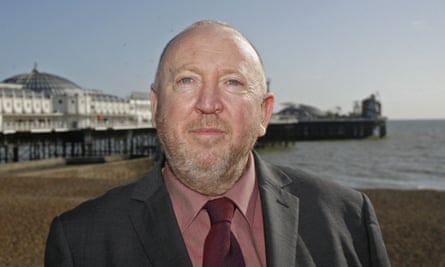
Public spaces
Libraries, galleries, parks, museums, town halls – all have fallen prey to the demands placed on local authorities by the need to make up for the loss of £18bn in central government grants. But cliffs? Last month, East Sussex county council unveiled plans to sell off the Seven Sisters white cliffs in the South Downs national park on the south coast.
Keith Taylor, Green party MEP for the south-east of England, is having none of it. “The proposal is, sadly, just the latest encroachment of austerity in our cherished South Downs,” he says of the plan to transfer management of the site to outside organisations, saving the council around £100,000 over the first two years.
“Public ownership of our landscape is the only way to guarantee the adequate long-term protection critical for safeguarding our heritage, biodiversity, water resources and public access to vital green spaces.”
Taylor’s words echo those of a select committee report, released earlier this year, into the future of public parks in England and Wales. It warned of parks facing “a period of decline with potentially severe consequences” in the face of council budget cuts.
It is a similar picture across much of the country, with the municipal heritage that gave expression to a vision of the British state being dismantled by the decline in central government funding.
The restraints imposed on spending have forced councils to sell off prized assets, with a cluster of “crown jewels” – Sheffield central library, Hornsey town hall in north London, Liverpool Municipal Buildings – being sold to developers to turn into hotels and apartments, often in the face of strong local opposition.
The Museums Association annual Museums in the UK report last week showed that a quarter of institutions around the country experienced a decline in funding in 2015-16, with local authority spending on museums in England having fallen by 31% between 2010 and 2016.
“Museums are at the heart of their communities and are a crucial part of the civic realm,” said the association’s director, Sharon Heal.
“They can help us understand our place in a rapidly changing world and play a unique role in connecting the past with the present. But in order for them to deliver the life-changing opportunities that they provide, they need sustained public funding.”
Dan Glaister
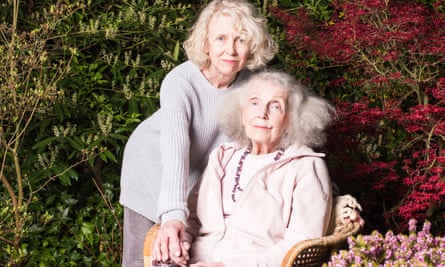
Social care
Sally Platt struggles to think how she would cope if the specialist dementia day centre attended by her 89-year-old mother closed its doors.
Eight years ago, her mother, Barbara Law – then in the early stages of the disease – broke her hip, and Platt was pointed in the direction of north London’s Netherwood Centre.
“It’s been a godsend and, to be honest, I think it also kept my mother from deteriorating. They kept her mind active – otherwise I think that she would have had to go into a care home,” says Platt, who is retired.
What she didn’t expect was to find herself among the ranks of those fighting for a third time to save the Netherwood Centre from closure. Facing central government cuts that have bitten deeply into social care, Labour-controlled Camden council has been considering the closure of four dementia and elderly people’s day centres, in a plan to bring users under one roof.
Before the deadline today of a public consultation about the controversial changes, council authorities said that they would save £582,283 from their current spend of £1.65m if the plan were enacted.
At the same time, the council points to what it describes as “a growing national crisis in social care” and the need to reduce its impact locally.
The situation in Camden is being played out around the country, with repercussions for the NHS, where staff tell of increasing numbers of patients being stuck in hospital for want of social services. Analysis by the Nuffield Trust of hospital bed occupancy found that delays in discharging medically fit patients were at a 10-year high.
The Local Government Association is warning, meanwhile, that authorities will have to continue cuts to essential services to plug shortfalls in adult social care. The body believes that 147 out of 151 local authorities responsible for social care will raise £540m more over the next financial year through a local “precept” (an extra charge on council tax to pay for social care), but that this will be swallowed up by the cost of paying the “national living wage” to care workers.
Platt regards the move by Camden council as a false economy. She and other local campaigners question why the council is choosing to reconfigure another centre when one that was purpose-built for people with dementia already exists.
Ben Quinn

Schools
When headteacher Andy Mellor meets school governors after the Easter holidays, he’ll face an impossible task: for a third year running he’ll need to cut tens of thousands of pounds from his budget.
The school has already slashed its specialist £20,000 speech and language scheme and cut back on classroom resources. Staffing has also been hit: four teaching assistant positions have gone and an assistant head has been lost through non-replacement of staff.
“This year we’ve got a £63,000 shortfall in our budget. I don’t know how we’re going to do it,” said Mellor, from St Nicholas Church of England primary school in Blackpool. “We’ve got no more temporary staff to let go.”
St Nicholas is one of many schools warning that budget pressures are unsustainable. Last month, the Association of School and College Leaders found that 80% of its members had increased class sizes over the past year, while 72% of respondents in secondary schools said subjects had been dropped from the curriculum.
Although the government has said that schools funding is ringfenced, headteachers have been hit with higher contributions to national insurance and teachers’ pensions, the introduction of the national living wage, pay rises and the apprenticeship levy. Headteachers have not been given extra money to meet these costs, and funding per pupil is not rising in line with inflation. A report by the National Audit Office found that schools face cuts of 8% in real terms by 2019-20.
On top of this, a new national funding formula will redistribute money away from schools in inner cities, in favour of those in rural areas. Even the so-called winners will gain only small amounts, says Mellor, who is vice-president elect of the National Association of Headteachers.
“It’s all well and good sharing the cake in a different way, but the cake’s just not big enough in the first place.”
Rebecca Ratcliffe
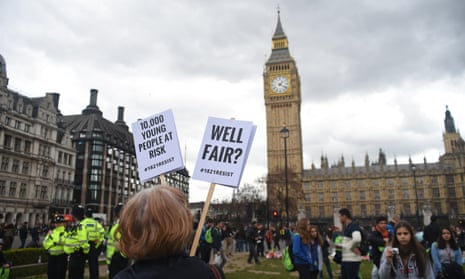










Comments (…)
Sign in or create your Guardian account to join the discussion